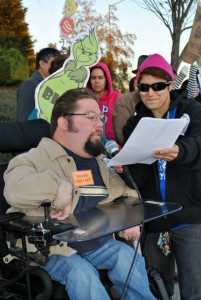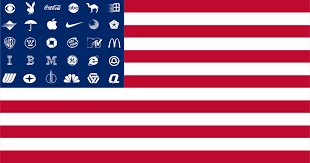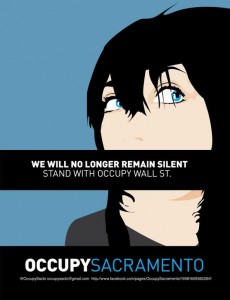“This is what democracy looks like!”
 Sure, I had participated in demonstration marches before. By the time that I first shouted the words above, I had already become, as per the news media, an “activist” for disability rights. As a member of DOGFITE (Disability Organizing Group For Initiating Total Equality), a Sacramento-area disability advocacy group hosted at Resources for Independent Living, I learned to use my voice to fight for equality. Many long days were spent in the California State Capitol waiting my turn to give testimony, often begging for legislative mercy during the inevitable cut-laden state budget process.
Sure, I had participated in demonstration marches before. By the time that I first shouted the words above, I had already become, as per the news media, an “activist” for disability rights. As a member of DOGFITE (Disability Organizing Group For Initiating Total Equality), a Sacramento-area disability advocacy group hosted at Resources for Independent Living, I learned to use my voice to fight for equality. Many long days were spent in the California State Capitol waiting my turn to give testimony, often begging for legislative mercy during the inevitable cut-laden state budget process.
In October 2011, I had an awakening. After attending a meeting in Fremont Park, with a group that would reunite in César Chávez Plaza to become Occupy Sacramento, I was made aware that I was no longer living in “the land of the free.” I had long felt that there was something fundamentally wrong with these words, often proudly sung at major sporting events and any other time that we Americans feel particularly patriotic.
 For the most part, like most of my friends, I was completely disinterested in politics and government. By the time high school rolled around, graduation requirements mandated that I take a semester of Government and a semester of Economics. There was nothing particularly memorable about the government class, aside from having a completely unmemorable Federalist versus Anti-Federalist debate. My only take away from the semester of economics was that we were taught laissez-faire was the greatest thing since sliced bread, and if you want to win at Wall Street simulations, betting on tech stocks was a relatively solid game plan. (Of course, going with the big banks would’ve been even better, but Microsoft, Compaq and Apple seemed so much more exciting!)
For the most part, like most of my friends, I was completely disinterested in politics and government. By the time high school rolled around, graduation requirements mandated that I take a semester of Government and a semester of Economics. There was nothing particularly memorable about the government class, aside from having a completely unmemorable Federalist versus Anti-Federalist debate. My only take away from the semester of economics was that we were taught laissez-faire was the greatest thing since sliced bread, and if you want to win at Wall Street simulations, betting on tech stocks was a relatively solid game plan. (Of course, going with the big banks would’ve been even better, but Microsoft, Compaq and Apple seemed so much more exciting!)
In the adolescent to early adult years that followed, I became acutely aware of one simple thing, which was ultimately the reason that I uprooted myself and moved nearly 2,000 miles west to Sacramento: I had no access to transportation without the aid of my parents’ lift-equipped van. My second day in Sacramento, the public transportation options available transformed my entire life. In just over a month, I was managing intercity travel as well — independently traveling from Sacramento to San Francisco without leaving my powerchair. A new world of access opened before me, and with it, a whole new set of challenges — including the rather lengthy process of learning to live independently.
 From that point forward, realizations of inequalities and realities of social injustice slowly revealed themselves. As I struggled to live independently, I learned that transportation was not my only barrier. At the very root of all of it was one simple thing: poverty. I knew I was living in poverty, but initially I refused to identify with the reality of it. The fear was that I would be one of those people who might end up on the street. Eventually, the fear very nearly became reality, and certainly would’ve, if it weren’t for the kindness of my care provider’s family and continued parental support. I could no longer deny my poverty status.
From that point forward, realizations of inequalities and realities of social injustice slowly revealed themselves. As I struggled to live independently, I learned that transportation was not my only barrier. At the very root of all of it was one simple thing: poverty. I knew I was living in poverty, but initially I refused to identify with the reality of it. The fear was that I would be one of those people who might end up on the street. Eventually, the fear very nearly became reality, and certainly would’ve, if it weren’t for the kindness of my care provider’s family and continued parental support. I could no longer deny my poverty status.
Through fortune and the assistance of Resources for Independent Living’s Transitional Living Center program, I was given the opportunity to live in a rent-subsidized apartment. I felt very different — I had voluntarily given up a rather privileged “middle-class” life, and yet I felt like I had chosen a path that had given me a far greater amount of personal independence.
Originally, I felt alone in this struggle. However, in 2007, it seemed much of California — and quite a lot of the rest of the nation — also experienced a shift from the comfort of middle-class life to poverty as the nation slipped into the greatest economic recession since the Great Depression. My caregiver’s grandmother lost the home that I had stayed in mere months earlier to foreclosure. Many houses in my new neighborhood, Oak Park, sat abandoned and neglected. For the homes that were not in disrepair, their market value plummeted by almost half in less than a year’s time. Whereas in my situation, I had traded economic stability for greater independence, many Californians were dealing with the harsh reality of losing both their economic security and their freedom, comfort, and homes.
 Then, in mid-September 2011, some folks in New York City — through the encouragement of Adbusters — got fed up. Occupy Wall Street became a rallying cry worldwide, and in solidarity, my newly minted Facebook page exploded with discussion. The first week of October, a Facebook event appeared for Sacramento — it featured an anime-styled young woman with a black bar covering her mouth, emblazoned with a call to action: We will no longer remain silent. Stand with Occupy Wall St.
Then, in mid-September 2011, some folks in New York City — through the encouragement of Adbusters — got fed up. Occupy Wall Street became a rallying cry worldwide, and in solidarity, my newly minted Facebook page exploded with discussion. The first week of October, a Facebook event appeared for Sacramento — it featured an anime-styled young woman with a black bar covering her mouth, emblazoned with a call to action: We will no longer remain silent. Stand with Occupy Wall St.
Timidly, I arrived in Fremont Park at the prescribed time. Initially, I saw nothing indicating any sort of gathering. Less than a half hour later, a group of about two dozen individuals developed a plan — the occupation of César Chávez Plaza. Less than a month later, I knew exactly what democracy looked like. I quickly learned that corporate capitalism was killing true democracy, replacing it with corporate plutocracy. Now that I was awakened to the source of the oppression, I was ready to fight back.
I’ve learned a lot since that time. I continue to believe that we are overly oppressed by corporate capitalism. However, I do believe that there is a way out — by demanding that our government defend us. We must take back our government and stop being apathetic. True democracy is governmental rule by the people. And that is the democracy that I’m willing to fight for.
Thank you for your hard work to make our city accessible for all